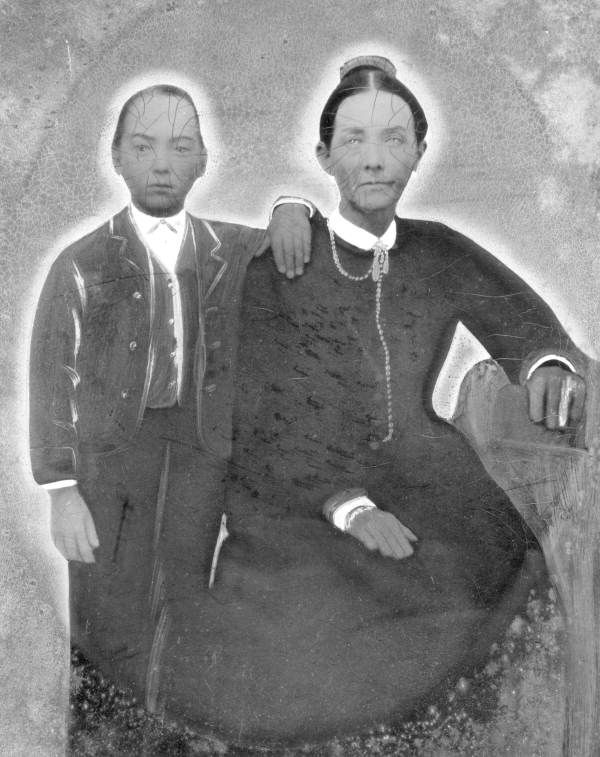Crime in Suwannee County – part 3
Published 9:30 am Friday, September 4, 2015

- Dr and Mrs John Krimminger - mid-1800s - painting a little out of perspective
Today is part 3 of our series on crime in Suwannee County.
Trending
Whatever you call it – the War for Southern Independence, War Between the States, the War of Northern Aggression, or the Civil War – it was a time of great upheaval in the 1860s. The end of the war in 1865 left a devastated South and over 600,000 dead. Among the changes wrought by the war was the end of slavery. After the death of President Lincoln (with Suwannee County citizen Lewis Thornton Powell involved in the assassination), the North enacted a military occupation of the South. This inflamed the hatred that some Southerners felt toward the North and increased racial tensions with the newly-emancipated African-Americans.
In 1871, due to the violence prevalent in the South as organizations such as the Ku Klux Klan became militant, the Federal Government commissioned a study to determine the reasons and extent. The resulting multi-volume work was entitled, Testimony Taken by the Joint Select Committee to Inquire into the Condition of Affairs in the Late Insurrectionary States (they liked longer titles back then). The Florida Secretary of State, Jonathan Gibbs, stated to the Commission the instances of murders that he knew about. These figures have since been disputed, but this is the list: Lafayette County – 4; Taylor County – 7; Hamilton County – 9; Suwannee County – 10; Columbia County – 16; Alachua County – 16; Madison County – 20; but Jackson County beat them all with 153. Madison County’s Sheriff stated that there had been 37 murders, not 20. The sheriff of Columbia County was run out of town, several Republican politicians were killed or scared off, and a variety of other troubles befell Republican whites and blacks.
Dr. John Newton Krimminger (also spelled “Kremminger” or Kreminger”) was the Republican County Judge of Lafayette County and had been a Union sympathizer during the Civil War. He also had been a medical doctor, a professor in Greek and Latin, a member of the 1868 Constitutional Convention, and Lafayette County School Superintendent. He was also noted for being a short man, only 5’ 2” tall. On October 5, 1871, Krimminger was killed on his front porch in New Troy by J. C. Poncher, former Lafayette County Clerk of the Circuit Court who had been removed from office by the Governor upon the recommendation of Judge Krimminger for being a Democrat. Krimminger replaced Poncher as Clerk with Krimminger’s own son-in-law. Poncher shot Krimminger from the second floor of the Lafayette County Courthouse. Poncher was not captured for some time since he would flee into Suwannee County whenever the sheriff in Lafayette County went looking for him. Judge Krimminger was the eighth person killed in Lafayette County in two years, purportedly by the KKK, because they were either a carpetbagger (a Northern transplant) or a scalawag (a Southerner helping the Reconstruction government).
One of those interviewed in this book was Thomas T. Long, Circuit Judge for the district that included Suwannee County. He talked about some of the problems associated with Southerners, white Republicans, and African-Americans in the area in and around Suwannee County. But then again, several others within the same book testified that Judge Long was reviled as corrupt and an opportunist. He was originally in favor of secession and a Democrat, but after the Civil War ended he joined the Republican Party and was pardoned. From the accounts described in the Testimony, Long rode the fence in order to appease both sides of the issue, helping the Republicans (the Northerners and African-Americans) when it benefited him and helping the Democrats (the white Southerners who had been in favor of secession), when it helped him best. According to one of the witnesses, it cost Long $3,000 then (about $50,000 today) in bribes to become Circuit Judge.
Another interviewed by the Committee was William Bryson, a Tennessee judge who moved to Suwannee County, became a State’s attorney, and by the time of the Committee Report, had become a circuit judge in Suwannee County. He also later became a state senator for Suwannee County. He discussed the fact that there were many bad crimes committed in his circuit of Columbia, Lafayette, Suwannee, Hamilton, Madison, and Taylor Counties and the perpetrators were nearly impossible to bring to justice because of the organization and sympathy of the community. Judge Bryson stated that he had continued to hold court even though he had been threatened with assassination.
Tensions eased up after the Federal Government enacted the Civil Rights Act of 1871, popularly called the Ku Klux Klan Act. It allowed the Federal Government even more powers to stop the intimidations and murders caused by various secret organizations. The Act would not eliminate the race-related crimes in Suwannee County, or the rest of the country, however.
Trending
Next week we continue our look at crime in Suwannee County.
Eric Musgrove can be reached at ericm@suwgov.org or 386.362.0564.


